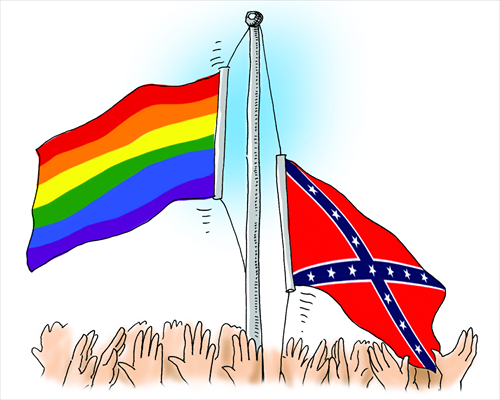HOME >> OP-ED
Flags represent US successes and failures
By Rong Xiaoqing Source:Global Times Published: 2015-7-3 0:33:01

Illustration: Liu Rui/GT
Two kinds of flags have dominated US headlines recently. The rainbow flag celebrating the legalization of gay marriage, and the Confederate flag which was flown by a white supremacist who later killed nine black people at a bible class at a church in Charleston, South Carolina. On the Internet, a comic has been circulating widely. It shows an ascending rainbow flag and a descending Confederate flag. It was hailed as a symbol of the big strides the country had just taken toward equality and freedom.
Few people were surprised at the rainbow flag's recent victory. The gay rights movement, born amid the civil rights movement of the 1960s, had already made significant progress before the Supreme Court made its decision to legalize same-sex marriage on June 26. Gays and lesbians have not only shown their pride in the annual gay parades in many cities, but have also been allowed to march with their banners in traditional cultural parades from Chinese New Year to St. Patrick's Day.
Big corporations boast of their tolerance by adding a rainbow to their websites or distributing rainbow cakes to employees during gay pride month in June. 34 states had already legalized same-sex marriage before the top court's ruling. The final decision from the Supreme Court was guaranteed to happen sooner or later - it turned out to be sooner.
But the Confederate flag is another story. Many people, especially in places like the Northeast and the West Coast, didn't know that it still flew in public places in parts of the South until the cries to take it down were triggered by the Charleston church massacre. Myself included.
I was in Charleston only a few weeks ago and history is everywhere in the city. Here is a building built on the site of Institute Hall where the Ordinance of Session, which withdrew South Carolina from the Union and led to the Civil War, was signed. There is a market selling handicrafts and tourist trinkets where slaves used to be sold. I went to various theaters to see performances, and on my way passed the Emanuel African Methodist Episcopal Church several times. I remember thinking that the city's past felt so far away.
Little did I know that not too far away, as at the state capital, the Confederate flag was still flying and in Charleston itself a young man named Dylann Roof had wrapped himself in the flag physically and emotionally, and was plotting an atrocity that lead to blood and tears being shed in the beautiful church.
The rainbow flag has heralded many small victories along the way to last week's decision. It may not be flying above government buildings but its strength is that it doesn't need to be - the people it represents are the living, breathing testament to what it represents. On the other hand, the Confederate flag is a witness to the South's many defeats in the US Civil War and to the many changes there have been in southern society since the abolition of slavery. Its weakness is that it needs official backing to be a symbol with any confidence.
Still, major victories, be it the election of the country's first African-American president or the legalization of gay marriage, are often celebrated exuberantly and hailed as the beginning of a new era. People take these things as a sign that all faults have been corrected, a milestone that deserves the question "What else do you want?"
Meanwhile, bias and discrimination is no longer as overt as it was but is now more subtle and evasive.
Jane Elliott, a retired primary school teacher and the initiator of the famous anti-racism "Blue eyes-Brown eyes" exercise, shared a story with me. She, a white person, went to a restaurant with a group of black friends. And the waiter immediately designated her as the spokesperson for the whole group and addressed all questions to her.
This sounds similar to the mortgage applicant with an Anglo-Saxon last name getting a better deal than those with more "black sounding" names, and a new Asian manager automatically being regarded as the "IT guy" by his colleagues. Things like these make one uncomfortable but you won't normally be outraged, and soon you'll forget it. It is just like the Confederate flag, flying but invisible to many people.
I'd like to see the Confederate flag taken down. But when it happens, I won't want it to be seen as a celebration of the collapse of the last relic of racism.
I hope we all keep in mind what Obama said in a recent podcast interview: "Societies don't overnight completely erase everything that happened 200-300 years prior … progress is real, and we have to take hope from that progress. But what is also real is that the march isn't over, and the work is not yet completed. And then our job is to try in very concrete ways to figure out, what more can we do?"
The author is a New York-based journalist. rong_xiaoqing@hotmail.com
Posted in: Viewpoint, Rong Xiaoqing